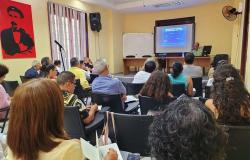(From Santiago, Chile) In his Public Account last Saturday, June 1, the president Gabriel Boric announced that it will send in the second half of the year a project of Legal Abortion Lawthe one who was refused strongly for the right, the church and even by parties considered friends of the government – such as the Christian Democracy -, being described as a true “time bomb”.
The country currently has a law – enacted in 2017 – that regulates the decriminalization of abortion on three causes: when the mother’s life is in danger, due to lethal fetal inviability and pregnancy due to rape. The Government, furthermore, does not count with the necessary majority in the Congress to carry out his proposal, for which he was accused by the opposition of sending a “flyer of lights” and to speak only to the political sector that he represents and not to all Chileans.
Despite this – and the annoyance that the news caused -, this Tuesday the Minister of Women and Gender Equality, Antonia Orellanaconfirmed in conversation with the program “A new morning” on Radio Cooperativa that the Government will send the bill in December, ensuring that “it won’t be enough” only with its decriminalization.
The authority explained that “we are going to do this accompanied by social dialogue because, indeed, the legislature is very important, but also the opinions that are very diverse, for and against in society, and therefore we are going to carry out this dialogue process.”
“Women in Chile deserve to be debated at least under a democratic framework and I emphasize the democratic framework because women in Chile we had the right to abortion for very broad health reasons from 1931 to 1989 and that was repealed by a decree of the dictator (Augusto Pinochet) without any democratic discussion,” said the minister.
“It seems to us that we have to have that discussion and what is going to be proposed is a legalization project. Why not just decriminalization? I think this is an important point for a progressive government, because if we only decriminalize, that is, we end the criminal prosecution of abortion, we are not going to be guaranteeing that the same women and poor girls that today they buy misotrol through the internet, who undergo precarious procedures in the field, can have access to decent health and therefore, “Decriminalization is not enough”he stressed.
Regarding the limit of weeks of gestation, Orellana flatly ruled out “a fake news that has already started to circle. There is no country in the world where abortion is legal. have no limits.”
The minister recalled that this It is not the first project of free abortion that is proposed to citizens. “There are previous projects. We must also remember, for example, that in the 2021 presidential primaries, the candidate – today Senator (Yasna) Provoste -, and together with, let’s say, the parties that supported her, proposed (an abortion law) up to the 14 weeks.”
“There are also models of different degrees in different countries. We are looking, of course, for what is closest to the reality of the Chilean assistance service,” he concluded.
According to the latest Cadem survey, published a day after President Boric’s announcement, 53% of Chileans agree with abortion on three grounds as dictated by current law; 22% support a free abortion law up to 14 weeks, and 10% agree with an unrestricted abortion law. In sum, only 32% are in favor of free legal abortionwhile 15% stated that they are about to ban it completely and return to a clean slate.
What’s more: the survey indicated that 80% believe “unlikely or not at all” that the Government manages to carry out this eventual and controversial proposal.






